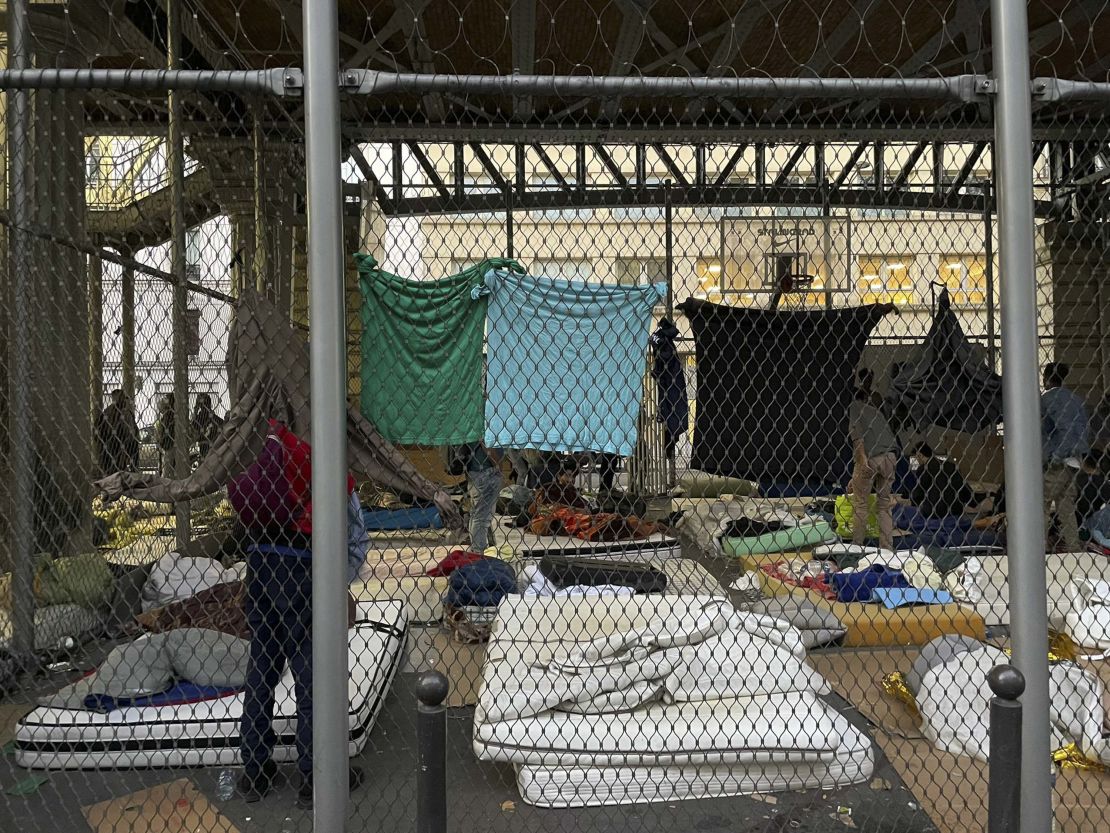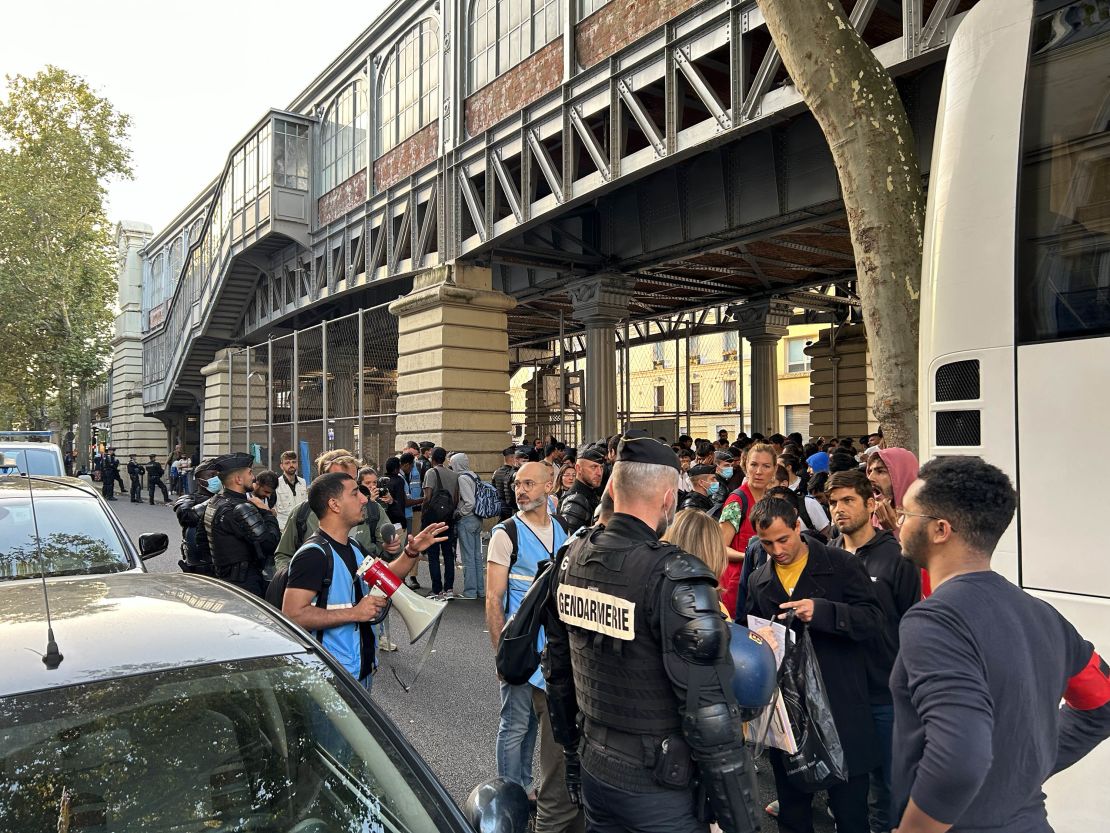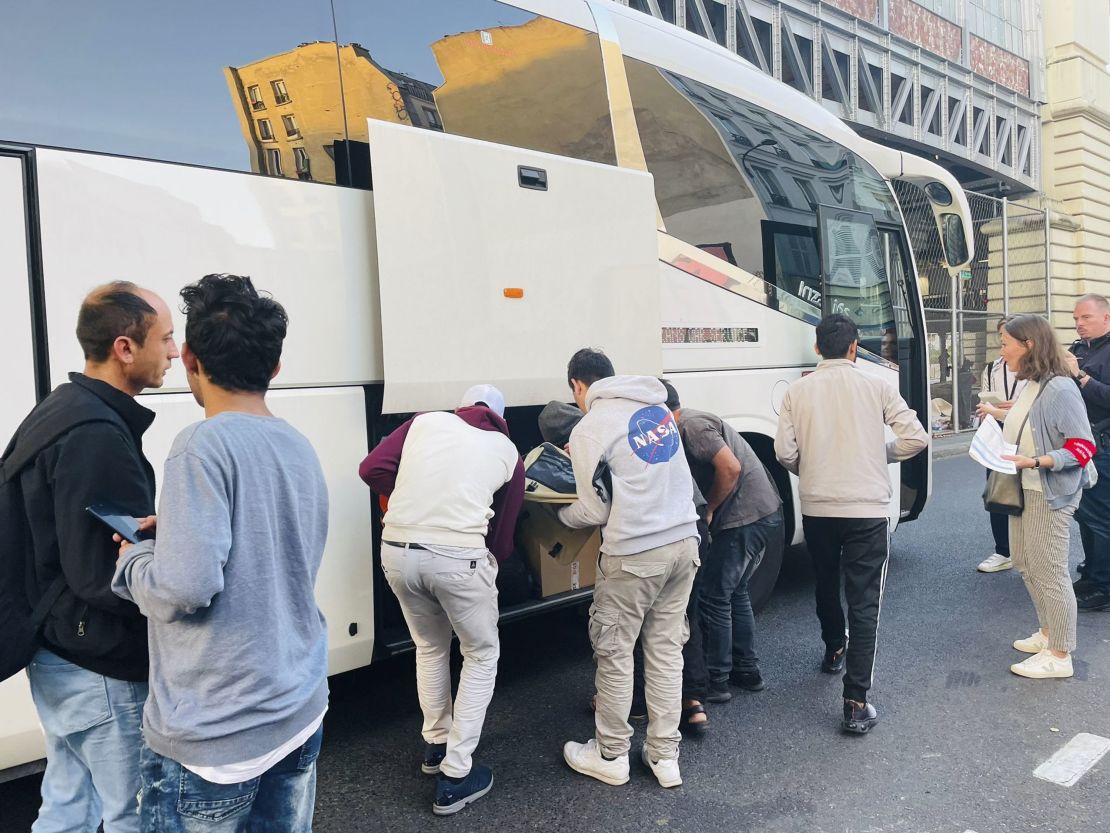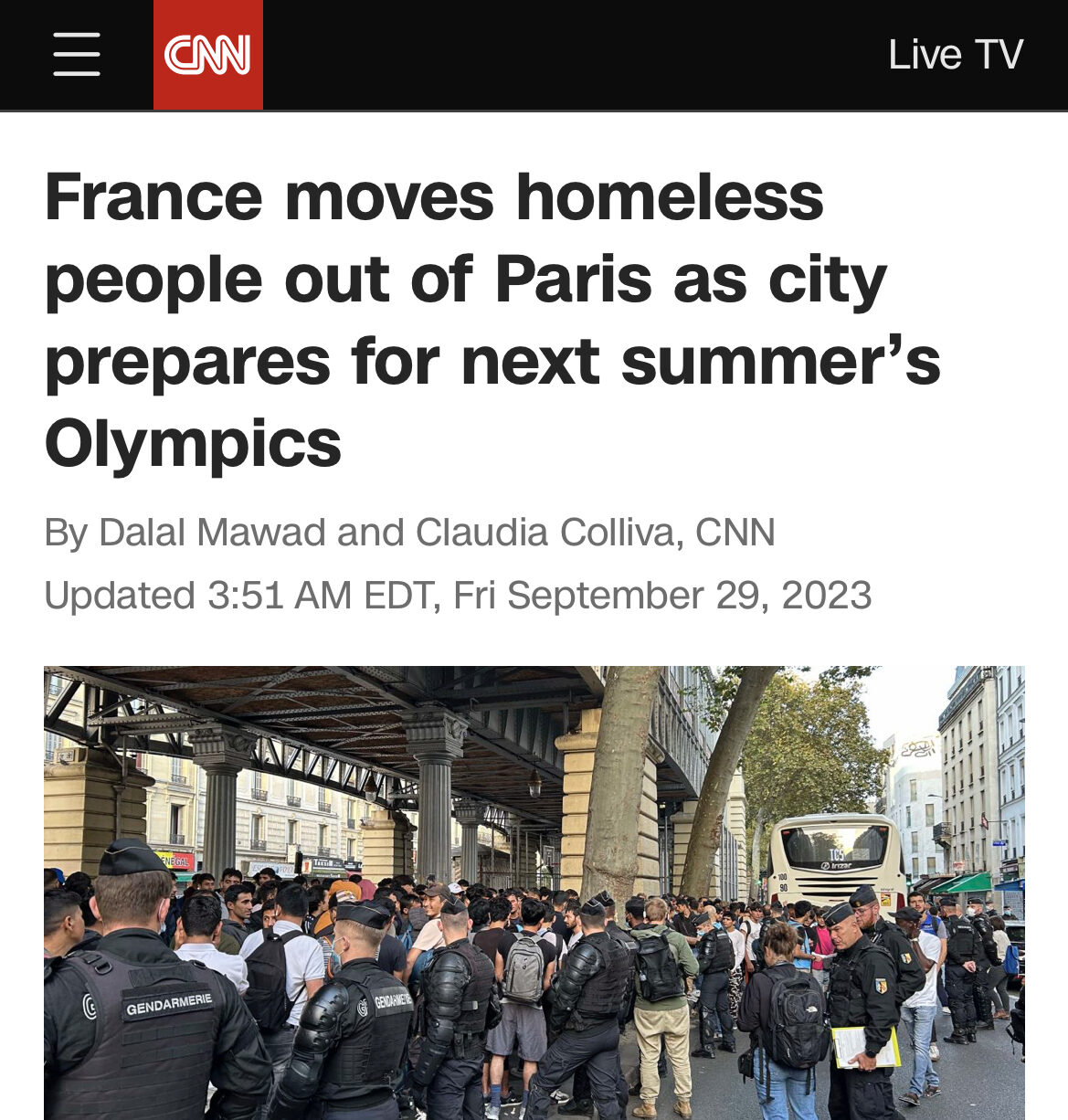Available at CNN.com
It’s 6.30 a.m. on a late summer morning in Paris. Amid the rumbling coming from the Stalingrad Métro station, in the northeast of the French capital, hundreds of migrants, mostly men, sleep crammed under an overpass. Some rest on pieces of cardboard and old mattresses behind a urine-doused fence, others lie awake by the side of the street.
Word is spreading that government buses are about to come and collect them. Some wait eagerly, hoping they’ll finally be offered housing, most are confused and fearful, concerned they’ll be forced to leave Paris.
For the past couple of months, the French government has been working to accelerate the transfer of Paris’ homeless to other parts of the country, as part of a plan to relieve some of the pressure on the capital’s emergency shelter services. Each week, between 50 and 150 people are taken to one of 10 locations across France, according to the government.
In spite of the government’s denial of any connection to the Olympics, which Paris will host in the summer of 2024, some non-governmental organizations and elected officials believe the Games are part of the reason why this relocation plan has been recently activated.
“We heard they were coming to take us today but I am not sure where to,” Obsa, a 31-year-old political refugee from Ethiopia, told CNN. He wishes to be identified by a pseudonym due to concerns about reprisals.
Obsa made the perilous journey to France in 2017, traveling from Ethiopia all the way through Sudan and Libya, and then across the Mediterranean to Italy.
He now has a full-time job in Paris but, even after so many years in the city, he has not been able to find permanent accommodation, largely due to extremely high rental costs in the capital and very limited availability of more affordable social housing. Obsa was relying on emergency housing in a hotel but says it kicked him out after his wife joined him. “They just refused. They said: we don’t have room for your wife,” he recalled.

Obsa is not alone in that experience. Ahead of next year’s Olympic Games, hotels in Paris have started canceling their emergency housing contracts with the government to make space for the expected influx of tourists, according to Paul Alauzy from Medecins Du Monde, an NGO that works with homeless migrants.
In 2022, there were approximately 50,000 homeless people housed in hotels nightly in the Ile-de-France region, where Paris is located, according to the Federation of Solidarity Actors, an umbrella group for local associations and charitable organizations. This year, at least 5,000 of the previously available hotel spots have already been canceled, CNN affiliate BFMTV reported, which could partly explain why refugees such as Obsa and his wife were pushed out onto the streets.
The Paris Prefecture told CNN that the effective number of lost emergency housing spots was closer to 2,000 because the city had found alternative solutions to compensate for the canceled hotel rooms.
In any case, the lost hotel rooms are far from being the main problem for France’s homeless population. Around half of the country’s homeless are concentrated in the Ile-de-France region, where they have access to more charities, job opportunities and personal connections.
According to figures from the Ministry of Housing, of the just over 200,000 homeless people housed each night in the country, 100,000 are in the Ile-de-France. Simply put, there are not enough emergency shelter spots in Paris to accommodate everyone.
‘Crucial moment’ for Paris
As Obsa is talking to CNN, dozens of French policemen approach and circle the area. A number of large white buses park and block the street. One of the buses has a sign that reads “Bordeaux,” another one says “Marseille,” cities hundreds of miles from the capital.
Staff and volunteers from local humanitarian organizations and the Paris police talk to migrants who appear at a loss about what is happening.
Authorities inform the migrants through a megaphone that they can board one of the buses to go to Marseille or Bordeaux, where they will be housed. Those who wish to stay in the capital are encouraged to show that they have a long-term work contract.
Even then, however, they won’t be guaranteed a roof over their head. “I can’t leave, I have a one-year job contract,” said Obsa, who works as an IT administrator. “I have to at least stay in the Ile-de-France region.”

In total, 1,800 homeless people, the majority of whom are migrants, have been moved outside of Paris since April, according to figures disclosed to CNN by the Interministerial Delegation for Accommodation and Access to Housing (Dihal), the government entity in charge of the national policy regarding access to housing.
Some 10 regional temporary shelters, known as SAS, have been set up around the country to welcome the new arrivals outside of Paris, according to the Dihal. Each SAS can accommodate up to 50 people.
“All of this is happening at a crucial moment, when there is also the preparation for the Olympic Games,” said Yann Manzi, founder of Utopia 56, a French NGO that works with homeless migrants, “and the inability of the state to deal with the reality of what is happening on the streets of Paris, which means continuing to leave thousands of people that have arrived on our territory without any support.”
In 2022, France received 155,773 asylum applications, according to the government. The Minister of Interior Gerald Darmanin has said in a number of televised interviews that France would openly welcome political refugees, but that its doors would remain shut to any migrants arriving in the country illegally who were not facing persecution in their home countries. According to government figures, in 2022, close to 20,000 irregular immigrants were deported.
In a televised interview Sunday, French President Emmanuel Macron insisted France was doing its part to help the migrants that arrive on Europe’s shores, spending, among other things, around 2 billion euros each year on emergency accommodation for homeless people. He concluded, however, that the country simply “cannot take in all the misery in the world.”
In a May 5 parliamentary discussion, former Housing Minister Olivier Klein said that the Ile-de-France’s homeless would need to be transferred to other regions, following the loss of emergency housing spots caused by Parisian hotels canceling their government contracts.
“The approach of major sporting events – firstly, to a lesser extent, the Rugby World Cup in 2023, and then the Olympic Games in 2024 – means that we have to think ahead and anticipate the situation, thanks to a policy of de-cluttering,” he said.
In a televised interview just a couple weeks later, on May 25, Klein denied any ties between the relocations and the Olympics.
The Dihal denied to CNN that there was any link between the relocation plan and the upcoming Games, insisting that the scheme aims to decrease the burden on the Ile-de-France region and ensure for the region’s homeless to have greater, more individualized support in the provinces.
A spokesperson for Paris 2024 told CNN the relocation plan had “nothing to do with” the Games or the Rugby World Cup currently under way in France.
“The situation regarding emergency accommodation in the Ile-de-France region is unfortunately nothing new, and has become more critical in recent months, irrespective of the fact that the region is hosting the Paris 2024 Games next year,” the spokesperson said.
‘We are just moving the problem’
Manzi, of Utopia 56, thinks the relocation effort could be a good idea in principle, but says the problem is that the regional shelters will only house people for three weeks, according to the cities tasked with hosting them, and what happens after that remains uncertain.
In the SAS, some people are helped to find housing and employment for which they may be eligible, based on their legal status, but it doesn’t work out for everyone. “On average, 25 to 30% (of people) go back to the streets,” said Manzi. “They find themselves at the end of these three weeks without any solution, and therefore end up on the sidewalks again.”
In Bordeaux, one of the cities selected to host a SAS, this number is as high as 40%. “They disappear,” Bordeaux deputy mayor Harmonie Lecerf-Meunier told CNN. “We presume they go back to Paris.”
According to the Dihal, in recent weeks, the number of people who have left the SAS they were sent to was around 17%.
The other problem is the lack of emergency housing spaces available in the regions where migrants are being transferred to. “So people will find themselves in the streets again, just not in Paris. We remove them from Paris and we put them on the streets elsewhere… we are just moving the problem, without solving it,” said Brice.
In a press statement from May 2023, the government said the housing minister had “asked the prefectures to work on setting up these centers in conjunction with local elected officials and associations.” But, the mayors’ offices of Lyon and Bordeaux, two cities hosting a SAS, told CNN they were never consulted by the government. “We found out the day before,” said Lecerf-Meunier of Bordeaux.
Similarly, Lyon deputy mayor Sandrine Runel told CNN that the government has rushed to relieve the situation in Paris and the Ile-de-France without ensuring the proper resources are in place elsewhere. “The Olympics are a pretext to direct people to the regions without any thought and without even checking the reception capacities that the regions have,” she said.
“The question of welcoming foreigners is a politically and socially difficult one,” said Brice, referring to migrants. “And so, the government has chosen not to talk about it which, in my opinion, is a mistake.”
Brice believes that sharing reception responsibilities across regions, if done properly, could allow France to offer much more careful, humane and ultimately efficient support to the thousands of migrants who enter the country each year. For the system to work, however, it needs to be well financed and well managed, said Brice. Most importantly, as activists and host cities maintain, all those involved – from the migrants being relocated, to the cities being asked to host them – need to be well informed and actively involved in planning.
“If the government does not take responsibility and does not provide itself with the proper means, it risks defeating the only useful solution for properly welcoming foreigners in this country,” Brice concluded.
No guarantee of long-term housing
Back in the homeless camp under Stalingrad Métro station, 29-year-old Abdullatif, from Afghanistan, looks stressed. “I heard we have to move out of Paris but I don’t want to. I am finally starting training as an electrician and I need to stay here,” said Abdullatif, who would only give his first name. He decides to remain in Paris.
Yet the fate of those who decide to stay in the capital is also uncertain. “You either accept what they offer you or you are back on the streets,” explained Alauzy, from Medecins Du Monde, who has now witnessed several relocation operations.

And, while departures to the regions are voluntary, many of the NGOs involved in the relocation plan told CNN that migrants are often not properly informed of what awaits them at their destination prior to departure. The Lyon and Bordeaux mayors’ offices supported this claim. They said that people have arrived in their cities having been promised permanent accommodation, when in fact nothing is guaranteed to them after the first three weeks in the local SAS.
Abdullatif and Obsa, and others who opted against relocation, are taken aboard a “Paris” bus, the precise destination unknown.
A few days later, CNN contacted Obsa again. He said he was still homeless, staying temporarily with a friend in Paris. The authorities had once again denied him and his wife emergency social housing, he said.
“They told me there is no place for me here, not even in the Ile-de-France region. It is unbelievable… How does an entire region not have space for two people?”
